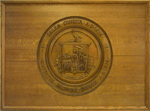Lyceum Hall: Difference between revisions
From Salem Links and Lore
No edit summary |
No edit summary |
||
| Line 1: | Line 1: | ||
*"Around the corner on Washington and Church streets, stands Lyceum Hall, built in 1831. Its exterior is unpretentious, its auditorium small and plain, but for lectures, readings and such entertainments it is most convenient. The hall is semi-circular in form, the rows of seats rising one above the other on an angle of thirty-five degrees," writes C. H. Webber in the book Old Naumkeag. | *"Around the corner on Washington and Church streets, stands Lyceum Hall, built in 1831. Its exterior is unpretentious, its auditorium small and plain, but for lectures, readings and such entertainments it is most convenient. The hall is semi-circular in form, the rows of seats rising one above the other on an angle of thirty-five degrees," writes C. H. Webber in the book Old Naumkeag. | ||
*Local lyceums were organized for the purposes of "mutual education" and offered both lectures and debates. Most lecturers were local citizens and offered their services gratis but bigger name people would be paid as much as $100. | *Local lyceums, following a national fad of the times,were organized for the purposes of "mutual education" and offered both lectures and debates. Most lecturers were local citizens and offered their services gratis but bigger name people would be paid as much as $100. | ||
*Judge Daniel A. White, the president of the Lyceum, delivered the first lecture on Feb. 24, 1830. Among the well know lecturers in the succeeding years were: Francis Peabody, Henry K. Oliver, Rufus Choate, Daniel Webster, Ralph Waldo Emerson, Oliver Wendell Holmes, and Horace Mann. | *Judge Daniel A. White, the president of the Lyceum, delivered the first lecture on Feb. 24, 1830. Among the well know lecturers in the succeeding years were: Francis Peabody, Henry K. Oliver, Rufus Choate, Daniel Webster, Ralph Waldo Emerson, Oliver Wendell Holmes, and Horace Mann. | ||
*On Feb. 12, 1877, in the Lyceum Hall an historic event took place. In front of a large audience, Alexander Graham Bell carried on the first telephone calls with his assistant Mr. Watson, who was in Boston. | *On Feb. 12, 1877, in the Lyceum Hall an historic event took place. In front of a large audience, Alexander Graham Bell carried on the first telephone calls with his assistant Mr. Watson, who was in Boston. | ||
Revision as of 11:18, 17 October 2008
- "Around the corner on Washington and Church streets, stands Lyceum Hall, built in 1831. Its exterior is unpretentious, its auditorium small and plain, but for lectures, readings and such entertainments it is most convenient. The hall is semi-circular in form, the rows of seats rising one above the other on an angle of thirty-five degrees," writes C. H. Webber in the book Old Naumkeag.
- Local lyceums, following a national fad of the times,were organized for the purposes of "mutual education" and offered both lectures and debates. Most lecturers were local citizens and offered their services gratis but bigger name people would be paid as much as $100.
- Judge Daniel A. White, the president of the Lyceum, delivered the first lecture on Feb. 24, 1830. Among the well know lecturers in the succeeding years were: Francis Peabody, Henry K. Oliver, Rufus Choate, Daniel Webster, Ralph Waldo Emerson, Oliver Wendell Holmes, and Horace Mann.
- On Feb. 12, 1877, in the Lyceum Hall an historic event took place. In front of a large audience, Alexander Graham Bell carried on the first telephone calls with his assistant Mr. Watson, who was in Boston.
- The wooden structure used by the original lyceum, was replaced by a brick structure, and now houses the Lyceum Restaurant.
See Also
- Historical Sketch of Salem by Chas. S. Osgood. p.116
- Old Naumkeag by C. H. Webber and W. S. Nevins, p.70-2
- "Lyceum was popular 19th century venue for entertainment and enlightenment" Salem News, May 23, 2005.
